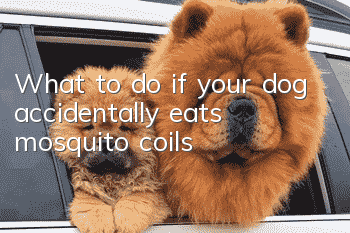What happens when a dog vomits? What medicine should be given?

What happens when a dog vomits?
1. If the dog vomits food and eats it back immediately, then it will be fine. This kind of vomiting is physiological vomiting, that is, vomiting similar to rumination. There is no need to see a doctor for this kind of vomiting.2. If the spitted out saliva is mostly due to an esophageal problem. Such as: foreign bodies in the esophagus (food stuck in the esophagus, usually bones)
3. If the color of the vomit is transparent or white and thin, this is gastric juice, which is the gastric acid secreted by the stomach. This type of Vomiting is most common in acute gastritis. (But if it becomes normal after vomiting, you don’t need to see a doctor yet. Just fast for 12 hours. If vomiting continues, you still need to see a doctor, because it may be caused by foreign bodies blocking the gastrointestinal tract, or the liver, kidneys, Vomiting caused by pancreatitis!)
4. If the color of the vomit is yellow, yellow, green, or green, it means that bile has been vomited out. Usually if you see vomiting of this color, you need to see a doctor, except In addition to the above-mentioned liver, kidney, pancreas and other problems, there are also ulcers in the gastrointestinal tract.
5. When the color of the vomited out is brown, it is not the color of the feed or food, but the color of the gastric juice is brown, which means there is bleeding in the stomach. The most common ones are gastric ulcers and duodenal ulcers.
6. If it is bright red, it is acute bleeding and you should go to the doctor as soon as possible.
What medicine should be given to a dog that vomits?
1. Generally, if vomiting does not affect eating, no special treatment is required.2. If frequent vomiting affects eating, fasting and drinking should be avoided for 4-6 hours to prevent accidental entry into the trachea. After vomiting stops, eat gradually, or supplement nutrition and water intravenously.
3. Sedation and anti-vomiting, such as oral administration of vitamin B6, diazepam, metoclopramide, atropine or chlorpromazine, intramuscular injection, or intramuscular injection of Emol to prevent vomiting.
4. If you vomit frequently and for a long time, do not eat, or vomit immediately after eating, and are accompanied by other abnormal symptoms, such as lack of energy, elevated body temperature, etc., you should be sent to a doctor for treatment in time.
5. Dogs often vomit, and the vomit is not food and has a different color. Gastritis, foreign bodies in the stomach, gastric volvulus, food poisoning, drug poisoning, or the early stages of canine parvovirus may be suspected.
Random articles
- What to do if your dog has a miscarriage
- How to train a mini poodle? Poodle training tips!
- How often should dogs be dewormed? A must-read for novice shit shovelers
- Precautions for raising Chow Chow in summer
- Causes and treatments for sneezing in dogs
- How to train cotton veil dogs to be obedient
- How many months does it take for a puppy to have toilet training?
- Is it because the dog’s eyes are sticky and sticky?
- How often should a puppy be vaccinated?
- How to raise red swordfish? red swordfish illustration



